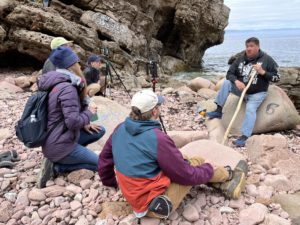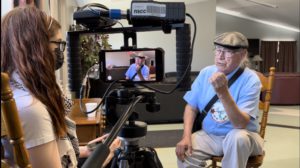In early 2022, [Rogers Chair in Journalism] Trina Roache joined one of the Master of Journalism classes to discuss an upcoming summer elective, Reporting in Mi’kma’ki, which would take place over the month of May and would involve traveling to Eskasoni to report on conservation in the community.
Upon hearing about this course I was immediately interested, especially being new to Nova Scotia, I thought this course would be a great way to learn more about the history of the Mi’kmaq and the unceded land we now stand on.
 The course ran Monday to Friday for four weeks. During the first week we spent most of our time in class learning about the language and history. Since this year’s course theme was conservation, we also spent time at the Museum of Natural History learning about Mi’kmaw use of land to survive but also preserve for future generations. A concept known as Netukulimk, which the Mi’kmaq use as a guiding principle to protect and sustain natural resources for generations to come.
The course ran Monday to Friday for four weeks. During the first week we spent most of our time in class learning about the language and history. Since this year’s course theme was conservation, we also spent time at the Museum of Natural History learning about Mi’kmaw use of land to survive but also preserve for future generations. A concept known as Netukulimk, which the Mi’kmaq use as a guiding principle to protect and sustain natural resources for generations to come.
The theme of conservation was something Trina, one of our instructors, discussed with the community prior to our reporting in Eskasoni, to ensure that we were shining a spotlight on what the community felt needed more coverage.
Working in groups, we created a reporting plan to highlight things like what exactly our story would focus on, who we would speak to and what questions we would ask. This helped prepare us for the following week when our reporting would take place.
During the second week of the course, we traveled to Eskasoni to start reporting. We interviewed different leading figures such as Rodney Alex, Tom Johnson, Clifford Paul and other vital members of the community about current Indigenous Protected and Conserved Areas (IPCAs) in Eskasoni and the surrounding area.
IPCAs are Indigenous-led projects that involve protecting and conserving certain areas that are important to the Mi’kmaq because they are considered sacred or because they possess essential resources. My group did our piece of journalism on the Kluskap’s Cave IPCA. This IPCA was recently acquired as an IPCA with the help of the Unama’ki Institute of Natural Resources (UINR). For this piece, I and two other classmates spoke with Clifford Paul from the UINR who guided us on our hike to Kluskap’s Cave and shared the sacred stories about the area along the way. We also spoke with Elders to hear why they want to ensure Kluskap’s Cave is protected and how they feel it should be conserved. We also spoke with other key figures from the UINR to understand what exactly an IPCA is.

Although this was the main focus of the course I learned so much more from the community by listening and observing. During our second week while working on our reporting we also got the opportunity to hear from Elders such as Georgina Doucette, who told us candidly about her experiences in residential schools. We were also able to learn about the importance of smudging and the honor song from George Paul, a community member in Eskasoni.
In the third week, we came back to the classroom to put together our pieces of journalism. We spent the week working with our instructors and each other to write, edit footage and put together a piece of journalism that could reflect what we learned during our time in Eskasoni, which wasn’t an easy feat considering we all learned so much.
In the final week we presented our work to the community back in Eskasoni. We were able to give back to the community by presenting these stories and on the same trip, we also participated in a clean-up with the UINR team at the Malagawatch reserve.
It was an experiential learning course that involved more than just the typical classroom learning. The hands-on reporting and opportunities we had to speak with community members were equally essential to the learning experience.
The Reporting in Mi’kma’ki course taught me to be a better journalist. Elder Albert Marshall spoke with us on one of our last days in Eskasoni and said there is a need to decolonize journalism. We need to be the storytellers for those that have been silenced. When it comes to the newsroom, we as journalists have an obligation to get the whole truth and tell the full story. This course will be something I reference when working to decolonize my own journalism and to help create a space for diversity in the newsroom when I start my career.
Haeley Cook DiRisio is a first-year Master of Journalism student.
Photos courtesy of the Reporting in Mi’kma’ki course and Eskasoni First Nation.
With thanks to Kathy Pratt LeGrow, BA’70, who generously made a gift to King’s in 2020 that continues to provide funding for this course.

